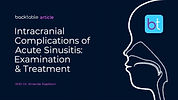BackTable / ENT / Podcast / Episode #113
Intracranial Complications of Acute Sinusitis in Children
with Dr. Amanda Stapleton
This week on the BackTable ENT podcast, Dr. Gopi Shah and Dr. Amanda Stapleton, a pediatric otolaryngologist from UPMC Children's Hospital of Pittsburgh, chat about the unique challenges of treating pediatric sinus and skull base diseases, orbital complications, and biofilm-covered Moraxella. They discuss source control, biofilm, and her research focused on the bacteriology of pediatric chronic sinusitis and patients with cystic fibrosis.
Be part of the conversation. Put your sponsored messaging on this episode. Learn how.

BackTable, LLC (Producer). (2023, May 30). Ep. 113 – Intracranial Complications of Acute Sinusitis in Children [Audio podcast]. Retrieved from https://www.backtable.com
Stay Up To Date
Follow:
Subscribe:
Sign Up:
Podcast Contributors
Dr. Amanda Stapleton
Dr. Amanda Stapleton is a pediatric otolaryngologist, associate professor, and director of the pediatric otolaryngology fellowship program with the University of Pittsburgh in Pennsylvania.
Dr. Gopi Shah
Dr. Gopi Shah is a pediatric otolaryngologist and the co-host of BackTable ENT.
Synopsis
First, they discuss how to recognize the signs and symptoms of pediatric patients who present with orbital or intracranial abscesses and how age and location of the abscess can influence treatment decisions. They also explain how to distinguish between intracranial and orbital abscesses and how to recognize the symptoms of sphenoid sinusitis. Both doctors emphasize the importance of involving infectious disease colleagues to evaluate antibiotic coverage and surgical indications.
Next, the doctors discuss the techniques for sinus surgery, including the use of a scope for visualization, warm irrigations, navigation, and augmented reality systems in the acute setting. Dr. Stapleton also provides tips on when to remove a middle turbinate and the importance of source control, especially in patients under the age of seven. An adenoidectomy may be necessary if the patient has had multiple colds throughout the winter and the decision is made to take down the lamina to drain an abscess pocket.
Finally, the doctors discuss the follow up process for children with chronic sinusitis, which may include office endoscopy and allergy testing, and discuss the rare cases of intracranial abscesses. In addition to being vigilant and proactive in monitoring the potential for repeat infections, imaging to detect any scarring or residual mucosal inflammation that might have resulted from the initial infection is also helpful.
Transcript Preview
[Dr. Amanda Stapleton]
It truly does depend on what complication we're dealing with and how stable the patient is. I had one girl roll in this fall with a huge intracranial abscess. The neurosurgery team took her back to the OR that day because she was lethargic and seizing, and opened her to drain this huge abscess. She was very unstable on the table. They were lucky to stop her bleeding. She was so anticoagulated from the infection. I was planning on doing her nose because her frontals were the source of this, but we had to close her up and then come back three days later and do her sinus surgery because we had to get her in a better state.
Disclaimer: The Materials available on BackTable.com are for informational and educational purposes only and are not a substitute for the professional judgment of a healthcare professional in diagnosing and treating patients. The opinions expressed by participants of the BackTable Podcast belong solely to the participants, and do not necessarily reflect the views of BackTable.














